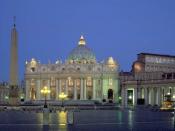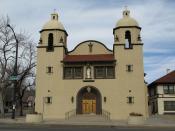The aim of the French revolution to create a constitutional monarchy, and its ideals - liberty, equality and fraternity were in conflict with the beliefs and administration of the Catholic Church. Attempts to overthrow the monarchy, and the execution of King Louis XVI in 1793 denounced the religious support for divine right, and undermined the beliefs of the Church. The close association of feudalism with religion led to the attack on Christianity by the revolution. The Church, in its adhesion to the Old Regime, demonstrated inequality which the revolution aimed to change. The abolition of the tithe, feudal dues and the tax exemptions with which the Church was privileged, were inevitable in a complete reform of the nation to achieve equality. The Enlightenment supported reform in its criticism of the Church's privileges and religious intolerance towards Jews and Protestants. The revolution did not aim to weaken the church directly, but in its attempt to achieve its ideals, Christianity was ultimately undermined.
In 1789, the confiscation and sale of Church land to solve France's financial difficulties mean that the Church lost more than its previous privileges of the tithe and feudal dues. Furthermore, freedom of worship granted to Jews and Protestants challenged the status of the Church by denying it as the sole state religion. The National Assembly considered the administration of the Church to be a secular issue, while acknowledging the importance of the Pope spiritually, hence it removed the Pope's power to appoint bishops and made the appointment of clergy a democracy. The Assembly felt the right to act accordingly as a representative of the nation, causing much conflict with the church over the impingement of religious rights. In 1790, all priests were obliged to take an oath of loyalty to the government, intensifying the reluctance of the clergy...


